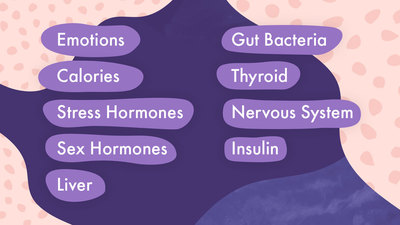Last updated on July 16th, 2024
When it comes to food, do you trust your body?
Do you trust it to let you know what it needs from your food—and what it doesn’t?
Or do you feel that if it were left to its own devices, you’d never stop eating or things would spin completely out of control? Perhaps you feel like what you eat almost seems to ‘stick’ to you? That you can eat like a little bird, exercise like mad, and yet still store body fat while others around you don’t seem to respond in the same way?
So many women feel betrayed by their bodies. They feel as though no matter what they do, their body just doesn’t seem to respond the way it used to.
And that’s because weight loss is about so much more than just what you eat and how you move—although both play a role. There are nine factors that influence whether the body gets the message to store fat rather than burn it. And for sustainable weight loss to occur, it’s important to iron out any kinks you might have in each of them.

You can make all the effort in the world with the food you eat, yet if your thyroid is struggling or your gut bacteria is mis-populated, sustainable weight loss will feel like an uphill battle—no matter how hard you try with food. This is why a traditional weight loss approach can be so disheartening for so many women—but it doesn’t need to be this way.
When you recognise that weight loss is about so much more than just what you eat, you open yourself to the understanding that it’s actually more about your health.
- What does your liver need in order to function optimally so it no longer recycles estrogen or stores problematic substances in your fat cells until it has the space to process them effectively?
- How can you support your nervous system to get the message it is safe more often than it is in danger so that your body doesn’t constantly get the message to burn predominantly glucose rather than fat?
- What will help the good gut bacteria in your body to flourish so that your digestive processes happen smoothly and your gut health is supported?
- What does your thyroid need in order to function optimally and maintain a healthy metabolic rate?
- How can you balance your sex hormones across your cycle or through peri- and post-menopause to reduce the troubling symptoms you experience and the flow on effects this has on your body fat storage?
- How can you maintain healthy blood glucose levels and lower insulin resistance to avoid all the health complications that come from too much of this hormone?
- What role are your emotions playing in your food choices as well as the messages your nervous system is getting about stress?
- How can you effectively reduce feelings of pressure, overwhelm or worry, to prevent the negative consequences that can result from an excessive and relentless production of stress hormones?
Of course food plays a part; it has to. Because food is how we nourish our body and feed all of these incredible processes that happen inside of us every day.
Yet, when you begin to look at all the other contributing factors that affect whether we store or burn body fat, it changes your relationship with food and your body—forever. Food is no longer solely about weight loss (or gain), it’s about nourishment. And trust becomes easier when you understand exactly what you need to do to support your body and all of its extraordinary systems.
If you want to take a deep dive into these nine factors to better understand your body and your health, check out my Weight Loss Redefined course.









